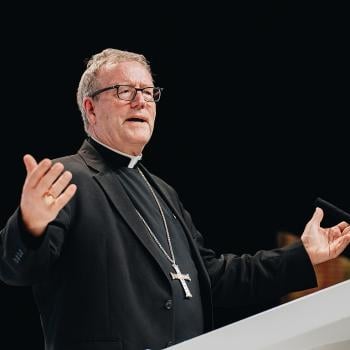I just read an article about a set of emerging renewed churches, two churches, actually, and one synagogue. And it was all about how we're making churches that aren't like those old-fashioned ones, they're places where we can feel comfortable.
But of course that's the impulse shared by members of the most conservative old-school parish, where you just mumble your way through the mass. Church is a place where you're comfortable. And it's a place that certainly replicates class structures and racial structures.
You go where you feel you belong (the phrase "our church home" is telling). Of course I understand that people want to feel at home. You live in capitalism, to be crude about it; you live in a hard place, and you want a place that feels authentic and real and where you can be yourself. But what I see over and over again is this inability to tell the difference between tradition and nostalgia.
And so, whereas I think there's incredible power in trying to recuperate tradition and reflect on it and consciously appropriate it, there's also this individual and social psychology of clinging to tradition, and "if we just keep doing the same things over and over again we'll be okay." Which is, of course, idolatry.
It was interesting to me that you make very clear distinctions among "religion," the church, theology, and practice. You say, for example, that religion is "a set of ideas about God." You don't talk much about sin, but when you do it's this surprising reading of the story of the Canaanite woman (from Matthew) in which Jesus has to be "healed of the sin of religion."
As someone who is not a scholar of religion, there are a couple of things that struck me when I became a believer. One is, of course, that every religion claims that it has the inherent path to truth, when in fact it is a catalog and piling on of heresies. You pile the heresies on top of each other and the ones that last become orthodoxy. There's a constant re-making of religion.
So, there's this desire for "pure" religion, and then there's actually how it's made. And how it's made is how all cultural stuff is made: people pile stuff on. And they sometimes fight over it, and they win by violence, and they win by persuasion. It's a cultural artifact that's made by people. Religion can also very easily become a way to manage God; this is why people say they lose their religion when bad things happen to them.
The idea that you're appeasing God by performing ritual actions is really profound. And people long for it -- I long for it. I like the idea that if I simply light the candles at a certain time and say the prayers at a certain time and cross myself in the right way, I will be safe. And I'll be good. And I'll be right with God. But that reduces God to an object that can be manipulated by my technology -- my words, thoughts, gestures. Or I create an even more complex system in which my priest tells me how to be right with God, and all I have to do is obey the human authority. I start to imagine I can control God.
Why I think that's sinful is that it takes you out of relationship, and I think sin is what breaks relationship. You're divorced from having to have a real relationship with God -- including one that is unsatisfying, frustrating, painful, confusing, mysterious.
It's hard. But people want it. They want to be protected from relationship with God and with other people but they yearn for it. They yearn for it so much, because it's great and scary. It's like falling in love; it's a powerful, real thing.
And this transcends politics. It's not as if liberals are any better at serving the poor than conservatives. You talk about these very progressive congregations using "charity" or "doing good" to distance themselves from those they're serving.
I think the desire to be good gets expressed in different ways. I have a friend, a volunteer at our food pantry, who sleeps in the street under a bridge and is here at 7:30 in the morning because he wants to do something for people. He's got a passionate desire to give something, because he's realized that the experience of giving changes him.
But there's also this alienated idea that you can please God by doing good deeds. Crossing yourself, saying the prayers, refusing to eat meat, are like being nice to a poor person. In other words, instead of having relationships with the people you're giving to, the act of charity becomes a magical ritual that will save you, or protect you, or make God like you better.
And I don't think God's interested in people being good.
I think the personalizing of God as a parent who wants you to behave is not helpful. I think the continual conversion and change of yourself to more and more reflect God's love: that process, of coming closer to God, is God's desire. Our patron saint Gregory of Nyssa says that we're most like God in our desire. That God's desire for us and our desire for God's love is a desire that is never satisfied, never reached. The more love there is, the more love is created.




